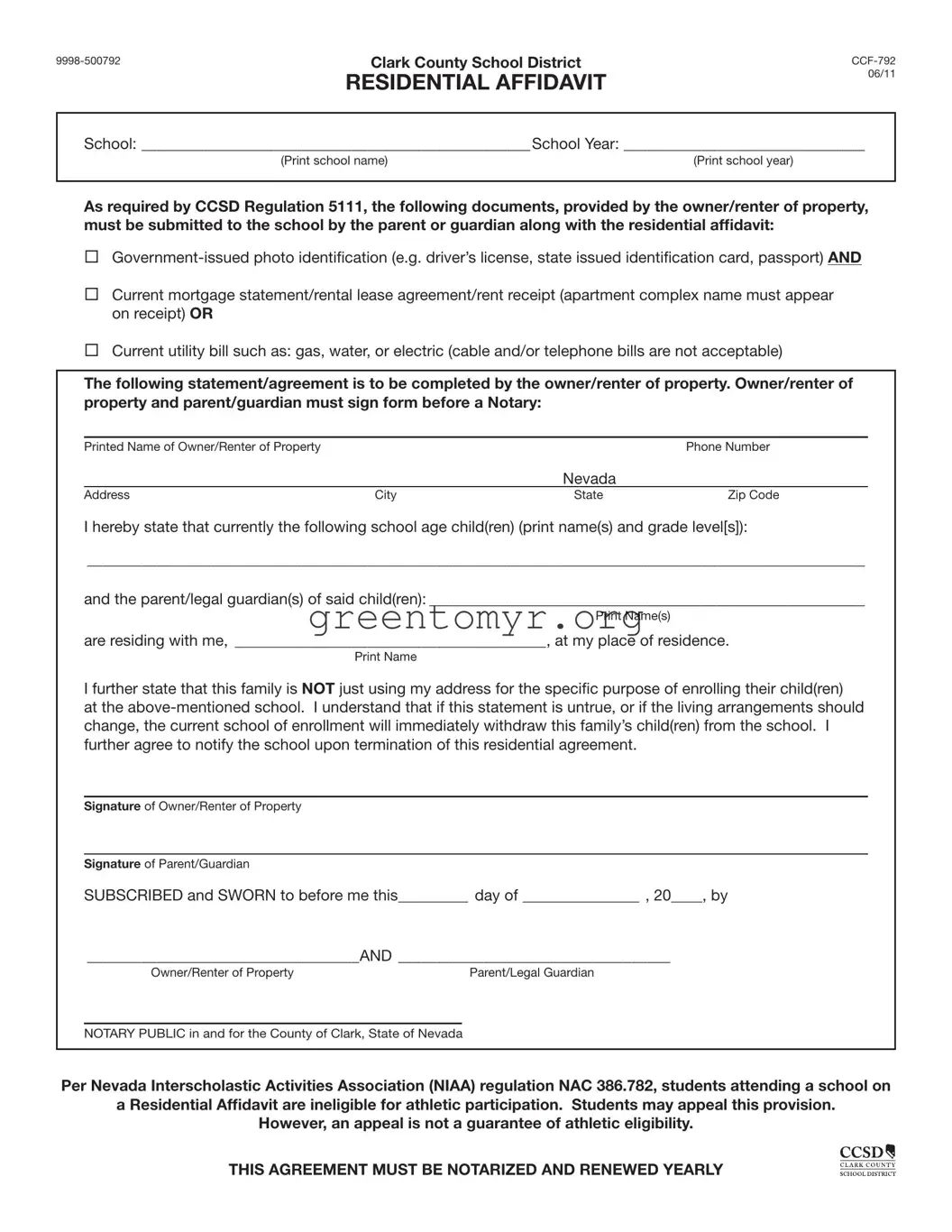Escuela: _________________________________________________ Año Escolar: _______________________________
(Escribir en letra de molde el nombre de la escuela) |
(Escriba en letra de molde el año escolar) |
Como se exige en el Reglamento 5111 de CCSD, los siguientes documentos, proporcionados por el dueño/arrendatario de una propiedad, deben ser presentados en la escuela por el padre o tutor junto con la declaración jurada de residencia:
Identificación con foto emitida por el gobierno (por ejemplo, licencia de conducir, tarjeta de identificación del estado emitida por el gobierno, pasaporte) Y
Declaración actual de la hipoteca/Contrato de arrendamiento del alquiler/recibo del alquiler (el nombre del complejo de apartamentos debe aparecer en el recibo) O
Recibo de un servicio actual como: gas, agua o electricidad (no se aceptan recibos del cable y/o teléfono)
La siguiente declaración/acuerdo debe ser completada por el dueño/arrendatario de una propiedad. El dueño/ arrendatario de una propiedad y el padre/tutor deben firmar el formulario ante la presencia de un notario:
Escribir el Nombre del Dueño/Arrendatario de la Propiedad en Letra de Molde Número de Teléfono
|
|
Nevada |
|
Domicilio |
Ciudad |
Estado |
Código Postal |
Por la presente afirmo que el siguiente niño(s) en edad escolar (escriba su nombre(s) y su nivel de grado(s) en Letra de Molde):
____________________________________________________________________________________________________
Y el padre/tutor(s) legal(es) del niño(s) mencionado: ______________________________________________________
Escriba su Nombre(s) en Letra de Molde
residen conmigo,___________________________________________ , en mi lugar de residencia.
Escriba el Nombre en Letra de Molde
Yo a continuación informo que esta familia NO está utilizando mi dirección con el propósito específico de inscribir a su hijo(s) en la escuela mencionada anteriormente. Entiendo que si esta declaración no es verdadera, o si la situación de la vivienda cambia, la escuela de inscripción actual inmediatamente dará de baja de la escuela al niño(s) de esta familia. A continuación estoy de acuerdo con notificar a la escuela al terminar este acuerdo de residencia.
Firma del Dueño/Arrendatario de la Propiedad
Firma del Padre/Tutor
FIRMADO Y JURADO ante mi este _________ día de ________________ , 20____, por
_____________________________________ Y ___________________________________
Dueño/Arrendatario de la Propiedad |
Padre/Tutor Legal |
NOTARIO PÚBLICO en y para el Condado de Clark, Estado de Nevada
Por la Asociación de Actividades Interescolares de Nevada (NIAA) reglamento NAC 386.782, los estudiantes asistiendo a la escuela bajo una Declaración Jurada de Residencia no cumplen con los requisitos para la participación atlética. Los estudiantes pueden apelar para esta disposición. Sin embargo, apelar no garantiza la elegibilidad atlética.
ESTE ACUERDO DEBE ESTAR NOTARIZADO Y SE DEBE RENOVAR ANUALMENTE


